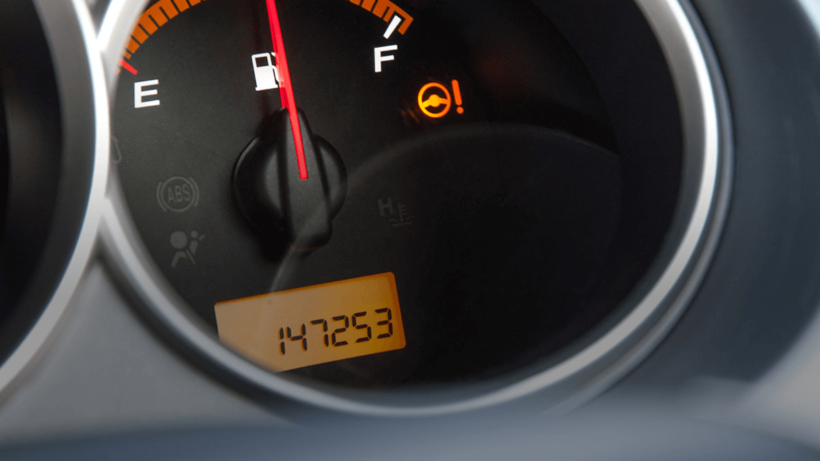As a rule, a correct and accurate car odometer reading plays a vital part in buying or selling used vehicles. By analyzing it, motorists can draw some conclusions about the car’s technical condition and possible issues. That is why authorities that are responsible for vehicle registration, in particular DMV institutions, require sellers to provide an odometer disclosure and reflect the odometer reading on a car title document. However, it is often possible to face miles marked as exempt from odometer reporting. That refers to old and classic cars that have crossed a certain, pre-defined odometer limit. In such a case, the vehicle receives the “exempt” mileage title. Usually, this status scares buyers who don’t want to face issues with such cars. That is why ClearVIN is here to answer some important questions about exempt mileage. What does exempt mileage mean? How to check the actual mileage of a car? Read our comprehensive odometer reading guide and find out all the details!
What Does an Exempt Odometer Mean?
The exempt mileage title is granted by the Department of Motor Vehicles (DMV) in situations where the vehicle’s odometer has surpassed its mechanical limits or has been tampered with, rendering it impossible to accurately determine the true car mileage. In such circumstances, the DMV may exempt the vehicle from the standard mileage disclosure requirements and issue an “exempt” title. This measure aims to protect potential buyers from overpaying for a vehicle based on misleading or unreliable mileage readings. Essentially, this happens when odometer reading is not the actual mileage.
It is crucial to understand that the issuing of exempt mileage titles may vary among states, both in terms of the criteria used and the reasons for granting them. Some states may mark vehicles with no odometer reading on title that have reached a specific age or have been in non-operational storage for an extended period. In contrast, other states may impose additional requirements, such as documentation or inspections, before bestowing an exempt mileage title.

These variations highlight the importance of familiarizing oneself with the specific regulations and practices in the respective state when dealing with vehicles that may qualify for exempt mileage titles. For example, odometer disclosure in Texas has its own specific rules that buyers and sellers must follow. By adhering to these guidelines, both buyers and sellers can ensure compliance, transparency, and fairness in automotive transactions involving vehicles with exempt mileage designations.
Why Would Mileage Be Exempt on Title?
To understand the subject better, it is vital to be aware of the reasons why a vehicle is mileage-exempt. The main points at which you can receive the exempt mileage title are as follows.
A vehicle is typically designated as having odometer reading exempt when it surpasses the maximum count allowed on old car odometers, which commonly reaches 99,999 miles. Once a vehicle’s mileage reaches this threshold, the odometer can no longer accurately display the true distance traveled. Therefore, to preserve the integrity of the odometer reading, the mileage is marked as exempt on the vehicle’s documentation.
In some cases, the age of the vehicle can serve as a reason for designating it as exempt mileage, particularly when the car was manufactured a certain number of years ago. For instance, if a vehicle has reached a specific age milestone, such as being manufactured 10 years ago or more, it may qualify for exempt mileage status. This recognition acknowledges that older vehicles often have incomplete mileage records and the potential challenges of accurately tracking their true mileage over time.
Another possible reason that can lead to a vehicle receiving an exempt mileage title is the replacement of the speedometer or dash cluster. When these original car items become defective or need to be replaced due to damage or malfunction, it can result in the loss of an accurate mileage reading. In such cases, the replacement unit may not have the ability to accurately display the true mileage accumulated by the vehicle prior to the replacement.
In addition, having an inoperable odometer can create complications when applying for a vehicle inspection. During a standard auto check, the inspector typically relies on the odometer reading to assess the car’s overall condition and verify its roadworthiness. However, if the odometer is not functioning properly or is completely inoperable, the specialist faces challenges in determining when the speedometer became broken and the actual mileage of the vehicle. In such situations, the car mileage exemption becomes relevant once again.

The exempt mileage title can also be issued if the vehicle has a tampered odometer and it is impossible to determine the actual mileage. Situations like these occur when the mileage displayed on the odometer is intentionally manipulated, usually to deceive buyers about the true usage of the vehicle. This compromises the accuracy of the recorded mileage, making it unreliable for figuring out the actual distance traveled by the vehicle.
Keep in mind that the reasons mentioned for the car mileage exemption can vary from state to state and are subject to local laws and regulations. If you have specific concerns or questions about mileage exemptions on a vehicle title, it is advisable to consult with the relevant motor vehicle department or agency near you for accurate and up-to-date information.
Pros and Cons of Purchasing a Vehicle With an Exempt Mileage Title
Purchasing a vehicle with exempt mileage can be a challenging choice for many people. Is exempt mileage bad? To make better decisions, a buyer should define the main goal they chase and be well aware of what they can get from the result. While there may be some benefits to purchasing a mileage-exempt vehicle, it is important to consider both the pros and cons carefully before making a final decision.
On the positive side, getting a car with an exempt mileage title is often cheaper than its counterparts. This is because buyers cannot get a clear history of the vehicle, and there can be some uncertainty surrounding the actual mileage of the car. Additionally, vehicles with exempt mileage are typically older, which could lead to a lower purchase price due to their age. Therefore, for budget-conscious car shoppers, purchasing a mileage-exempt vehicle can be a cost-effective option.
However, on the downside, purchasing a car with exempt mileage can bring about a host of problems. First, buyers do not have a clear history of the car, making it difficult to know whether the vehicle has been involved in past accidents. This can be a significant concern because accident reports can affect the future reliability of a car. Second, the odometer reading, which is the primary indicator of the condition of a used car, may not be accurate. This is because some sellers may manipulate the odometer to reduce the mileage, which can make it seem like the car has not been used as much as it actually has.
In addition, getting an exempt mileage vehicle may make it difficult to sell the car in the future. Buyers may hesitate to purchase a car with an unclear history or one that may have been driven more than what is indicated on the odometer. Moreover, when it comes to car insurance, older vehicles typically have higher rates, and if the age of the automobile is combined with a lack of available information, the price could be even higher.

Some buyers wonder, what does the mileage on the car mean if it’s exempt? Essentially, it indicates that the actual mileage may not be traceable, and buyers must approach such purchases with caution.
Purchasing a vehicle with an exempt title involves certain risks and rewards. While it might save the buyer some money in the short term, there are concerns about the actual mileage and overall history of the vehicle that could lead to problems down the line.
The Bottom Line
The exempt mileage title is used when the mileage displayed on a vehicle’s odometer cannot be verified as accurate due to exceeding the odometer’s mechanical limits or being tampered with. It is issued by the DMV to protect potential buyers from paying more for a vehicle than it is actually worth. When buying or selling a vehicle with an exempt mileage title, it is important to understand the potential risks and take appropriate steps to verify the vehicle’s true mileage. Overall, the exempt mileage title is an essential designation that serves to protect consumers in the used car market.
If you want to check whether a used car has exempt mileage, a VIN lookup from ClearVIN is your best solution. In just a few clicks or smartphone taps, you can receive a comprehensive vehicle history report with a disclosed odometer reading. That is why our VIN decoder can help you buy a decent used car. If you have any questions, feel free to email [email protected] or call us at: +1 (844) 268-5991 (8:00 AM – 3:00 PM EST, Monday to Friday).









